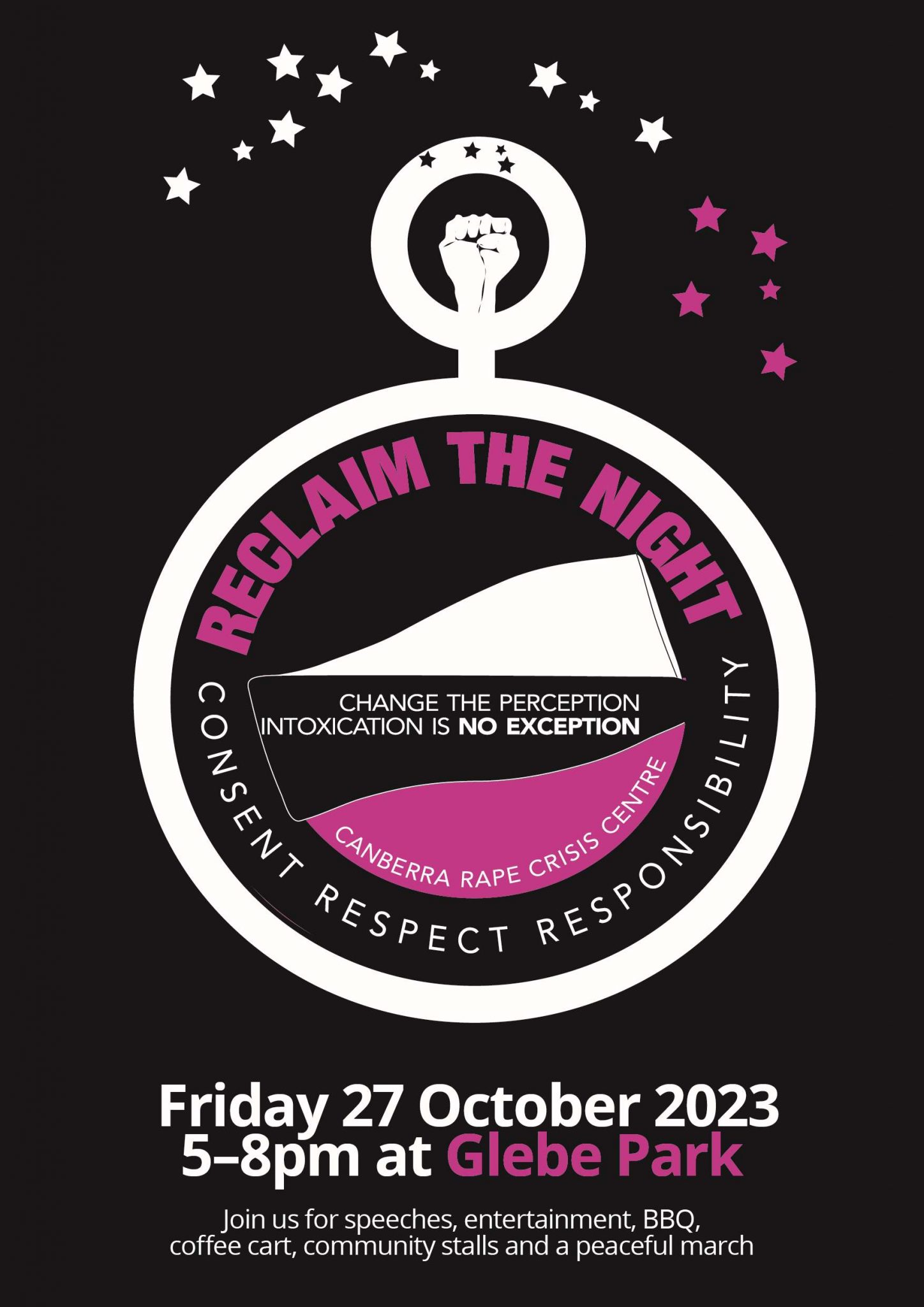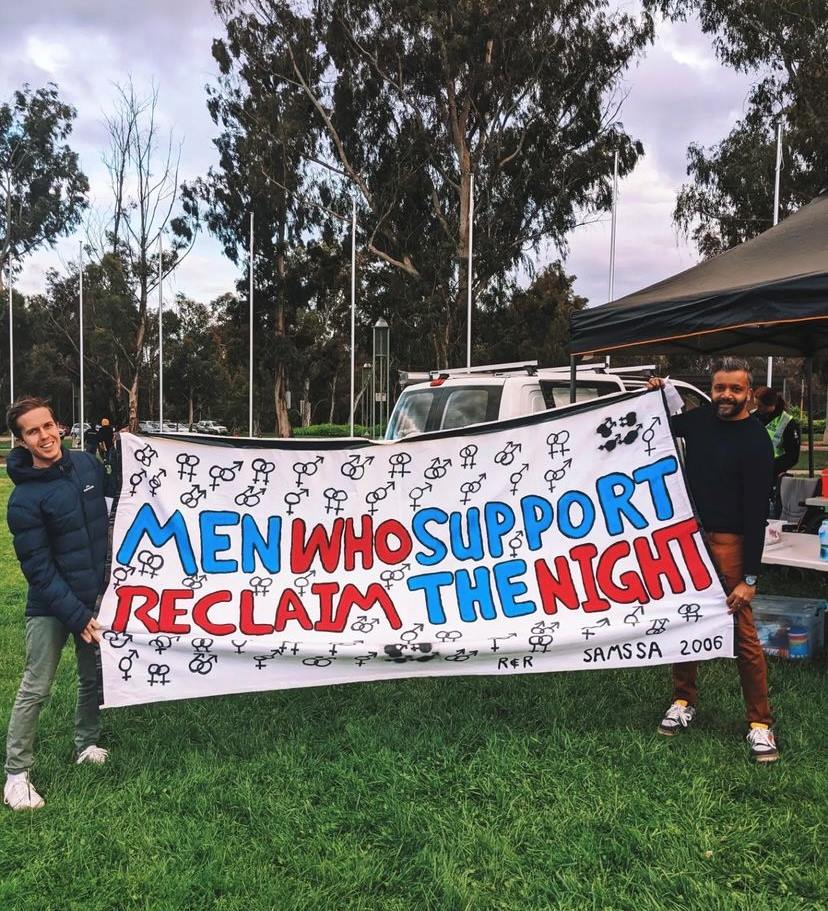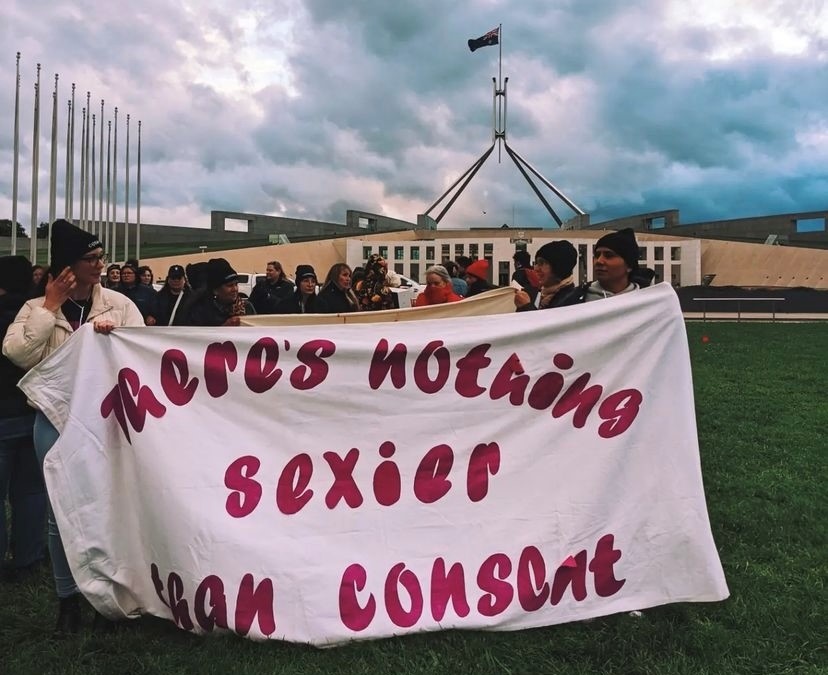In the late 1970s, women took to streets around the world to protest for their right to walk at night without the fear of sexual assault. Ask any woman you know whether she feels safe to walk alone at night and you will see why the rally still continues today. Reclaim the Night (RTN) heads to Glebe Park on Friday 27 October.
Also known as Take Back the Night, RTN had historically been a march in which protestors took over high visibility streets to take a stand against sexual violence against women. As societies have changed, RTN’s vision evolved to include other forms of gender-based violence against women, transgender and gender-diverse people, though sexual violence remained the core issue.
Evolving to a more symbolic protest, RTN stands with victim survivors against the messages that enable victim blaming and to reduce the messaging around sexual violence in our community.
In the past few years, the Canberra Rape Crisis Centre (CRCC) has aimed to make the RTN events family appropriate and a place where children can feel safe. Next Friday, there will be performances, market stalls and speeches that bring sexual assault out of the shadows and into the collective mind of our community.
The theme of this year’s event focuses on drug and alcohol-facilitated violence and when consent is negated due to intoxication. The event will draw the community’s attention to the potential vulnerability to sexual violence that comes with drug and alcohol use.
“One of the things that we’ve noticed since the Covid lockdowns is that rates of sexual violence being reported to CRCC where drugs and alcohol have been involved, have increased. I guess that sort of makes sense if the community was moving from being a lockdown community to a community that was moving about freely again,” says Chrystina Stanford, CEO of Canberra Rape Crisis Centre.

The umbrella of sexual violence is broad and includes indecent sexual assault, rape, sexual harassment in the workplace, and child sexual assault.
“The unfortunate thing about where we’re at as a community is that over the decades we haven’t managed to reduce the prevalence rates of sexual violence,” says Ms Stanford. “Reclaim the Night has an important place in the community still; it is a safe place for survivors to come and be visible and join parts of the community who stand up against all of the discrimination and victim blaming we still see happening.”
It isn’t just at night that sexual violence occurs, says Ms Stanford; it also happens in the daylight and at times and in places where we should be safe. RTN believes that everyone should be safe from violence and harassment no matter where they are, what time of the day it is or what they are wearing.
While standing up against the continued prevalence of sexual violence in communities across the world, RTN also honours those who have been harmed.
First held in Leeds, England, the march was inspired by a similar rally in Belgium the year before. The British protest was in response to police telling women to stay indoors to protect themselves as a man was killing women. Peter Sutcliffe killed 13 women between 1975 and 1980 and attempted to kill at least seven others.
“The media coined this guy ‘the Yorkshire Ripper’. If you google him, there are millions and millions of stuff, sites that you can read about this guy. If you try and look for the names of the victims, there is way less documented evidence about who they were as people. I think that’s an interesting reflection on the issue itself,” says Ms Stanford.
Victim-blaming language continues
Nearly 50 years later, the victim-blaming language still leads many conversations around sexual assault. Ms Stanford says we frequently hear ‘why she was out, why was she wearing that’ and even questions of whether it was ‘actually’ assault.
“We see those messages play out in our culture broadly, every single day,” she says. “This protest is about standing up against those messages and saying the responsibility for sexual violence sits with those who perpetrate it and the systems within the community and society that we allow to continue to perpetuate negative messages against victims of sexual assault.”
According to Ms Stanford, the fear of not being believed remains one of the biggest barriers for survivors seeking justice. She says if people were subjected to another type of crime, they would report it immediately. However, on average it takes a woman ten years and a man 30 years to speak about their sexual violence experience.
“When you consider how long that means that survivors are living in our community with too much fear to be able to even disclose what’s happened to them it tells us about the community readiness to respond to the issue.”

The changes need to happen at every level, from interpersonal interactions to government-mandated legislation. Ms Stanford says if we had a community capacity to better respond to sexual violence then the path for survivors would be quicker and more validating.
“Stats haven’t changed for decades; we know that one in three girls and one in six boys will be sexually assaulted before the age of 15 in Australia. We also know that anywhere from two to five women, depending on what research you’re reading, and one in 16 men will be sexually assaulted across an adult lifetime. So, when you put those statistics together that’s a lot of people within our community,” she says.
Ms Standford says the path is already there; over the past few decades, the issue of domestic violence has been brought to light through conversation, representation and campaigns. No longer is it something that stays behind closed doors; victim survivors are encouraged to reach out for help without any shame or stigma attached and, most importantly, they are believed.
“We need the same investment around sexual violence, we need to help build a tolerance, and a capacity to even respond to people who disclosed. One of the simplest messages for somebody who discloses sexual violence is ‘I’m really sorry that happened and I believe you’,” Ms Standford says.
Reclaim the Night will be held at Glebe Park on Friday 27 October 5-8pm; crcc.org.au
If you or someone you know is impacted by sexual assault, domestic or family violence, you can call or visit the website of:
- Canberra Rape Crisis Centre: 02 6247 2525
- 1800RESPECT: 1800 737 732
- Domestic Violence Crisis Service ACT: 02 6280 0900
- Lifeline: 13 11 14
- In an emergency, call 000
Canberra Daily would love to hear from you about a story idea in the Canberra and surrounding region. Click here to submit a news tip.



